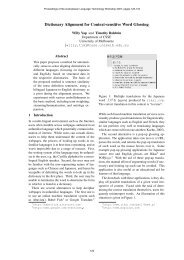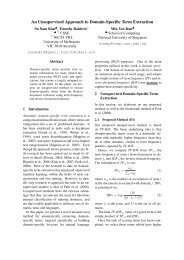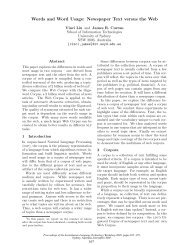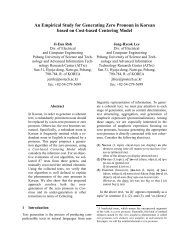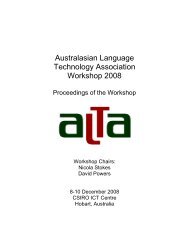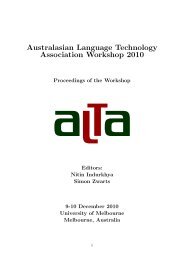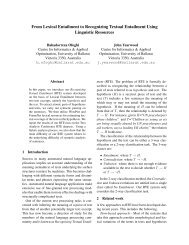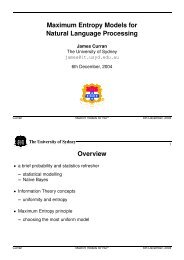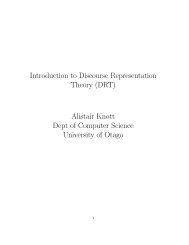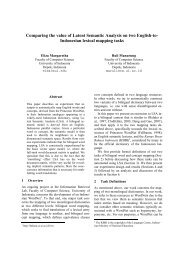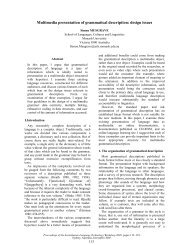Full proceedings volume - Australasian Language Technology ...
Full proceedings volume - Australasian Language Technology ...
Full proceedings volume - Australasian Language Technology ...
Create successful ePaper yourself
Turn your PDF publications into a flip-book with our unique Google optimized e-Paper software.
Overview of the ALTA 2012 Shared Task<br />
Iman Amini* David Martinez † Diego Molla‡<br />
*RMIT Dept of Computer Science and NICTA, Australia<br />
† NICTA and the University of Melbourne, CIS Department, Australia<br />
‡Department of Computing, Macquarie University, Australia<br />
iman.amini@rmit.edu.au<br />
david.martinez@nicta.edu.au<br />
diego.molla-aliod@mq.edu.au<br />
Abstract<br />
The ALTA shared task ran for the third time in<br />
2012, with the aim of bringing research students<br />
together to work on the same task and data set,<br />
and compare their methods in a current research<br />
problem. The task was based on a recent study<br />
to build classifiers for automatically labeling sentences<br />
to a pre-defined set of categories, in the domain<br />
of Evidence Based Medicine (EBM). The<br />
partaking groups demonstrated strong skills this<br />
year, outperforming our proposed benchmark systems.<br />
In this overview paper we explain the process<br />
of building the benchmark classifiers and<br />
data set, and present the submitted systems and<br />
their performance.<br />
1 Introduction<br />
Medical research articles are one of the main<br />
sources for finding answers to clinical queries,<br />
and medical practitioners are advised to base<br />
their decisions on the available medical literature.<br />
Using the literature for the purpose of medical<br />
decision making is known as Evidence Based<br />
Medicine (EBM).<br />
According to the EBM guidelines, users are<br />
suggested to formulate queries which follow<br />
structured settings, and one of the most used systems<br />
is known as PICO: Population (P) (i.e., participants<br />
in a study); Intervention (I); Comparison<br />
(C) (if appropriate); and Outcome (O) (of an Intervention).<br />
This system allows for a better classification<br />
of articles, and improved search. However<br />
curating this kind of information manually is unfeasible,<br />
due to the large amount of publications<br />
being created on daily basis.<br />
The goal of the ALTA 2012 shared task was<br />
to build automatic sentence classifiers to map<br />
the content of biomedical abstracts into a set of<br />
pre-defined categories. The development of this<br />
kind of technology would speed up the curation<br />
process, and this has been explored in recent<br />
work (Chung, 2009; Kim et al., 2011). One of the<br />
aims of this task was to determine whether participants<br />
could develop systems that can improve<br />
over the state of the art.<br />
2 Dataset<br />
Different variations and extensions of the PICO<br />
classification have been proposed and the schema<br />
used for this competition is PIBOSO (Kim et al.,<br />
2011), which removes the Comparison tag, and<br />
adds three new tags: Background , Study Design<br />
and Other. Thus, the tag-set is defined as follows:<br />
• Population: The group of individual persons,<br />
objects, or items comprising the study’s sample,<br />
or from which the sample was taken for<br />
statistical measurement;<br />
• Intervention: The act of interfering with a<br />
condition to modify it or with a process to<br />
change its course (includes prevention);<br />
• Background: Material that informs and may<br />
place the current study in perspective, e.g.<br />
work that preceded the current; information<br />
about disease prevalence; etc;<br />
• Outcome: The sentence(s) that best summarise(s)<br />
the consequences of an intervention;<br />
• Study Design: The type of study that is described<br />
in the abstract;<br />
Iman Amini, David Martinez and Diego Molla. 2012. Overview of the ALTA 2012 Shared Task. In Proceedings<br />
of <strong>Australasian</strong> <strong>Language</strong> <strong>Technology</strong> Association Workshop, pages 124−129.



